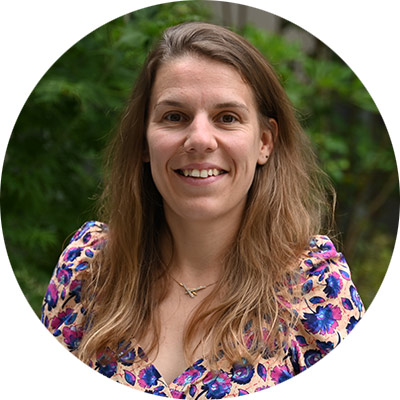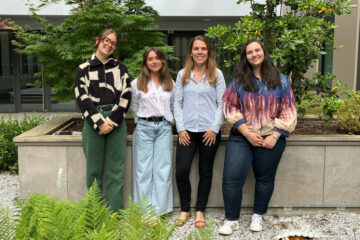Women’s voices: Céline Nicolas
 For this new episode of the Bordeaux Neurocampus’ Women’s Voices series, Milesa Simic, PhD student at IMN, has interviewed Céline Nicolas, leader of the NEED team at the INCIA since January 2024.
For this new episode of the Bordeaux Neurocampus’ Women’s Voices series, Milesa Simic, PhD student at IMN, has interviewed Céline Nicolas, leader of the NEED team at the INCIA since January 2024.
Milesa Simic : Could you give us an overview of your academic background?
Céline Nicolas : I have had a fairly traditional academic path. My initial goal was to become a biology teacher. So, I began a bachelor’s degree in biology at the University of Limoges, which I completed at the University of Poitiers with a specialization in animal physiology and neuroscience. That third year of my degree was a turning point — it was then that I realized I wanted to pursue neuroscience and become a researcher. I went on to complete a Master’s in Physiology, Pharmacology, and Neuroscience. During my Master’s, my internships focused on cell transplantation in mouse models of neurodegenerative diseases. This is where the central question that still guides my research today was born: how can we understand the brain under pathological conditions and restore its physiological functions?
At the end of the Master’s, I naturally wanted to continue with a PhD. I applied to several doctoral programs without success at first, but I was lucky enough to be offered a position by Dr. Marcello Solinas in his team at the Laboratory of Experimental and Clinical Neurosciences in Poitiers. There, I studied the impact of environmental factors on vulnerability to drug relapse. After my PhD, I spent a year as a temporary teaching and research assistant in the same lab.
I then began my first postdoc at the National Institute on Drug Abuse (NIDA) in Baltimore, under the supervision of Dr. Yavin Shaham and Dr. Satoshi Ikemoto. During these three and a half years, I focused on sex differences in vulnerability to relapse. With a strong background in behavioral neuroscience, I wanted to deepen my understanding of circuit neuroscience. So, I started a second postdoc in Dr. Anna Beyeler’s lab at the Neurocentre Magendie, Bordeaux Neurocampus. During these four and a half years, I studied the role of the insular cortex and its projections in anxiety-related behaviors.
At the end of my postdoctoral fellowship, I was awarded an ATIP-Avenir to establish my own research team at the Institut de Neurosciences Cognitives et Intégratives d’Aquitaine (INCIA), Bordeaux Neurocampus, in January 2024. That same year, I was appointed as a CNRS tenured researcher (CR CNRS).
In your opinion, what have been the most important personal and work challenges you have faced to reach this stage in your career?
This isn’t an easy question, as becoming a researcher involves a series of small challenges, both personal and professional. If I had to name a few, on a personal level, the most significant was probably leaving for the United States alone with just my two suitcases to begin my first postdoctoral position. I didn’t know exactly what to expect, nor whether I had all the necessary skills required for the job. In the end, that experience turned out to be one of the most enriching, both personally and professionally.
On a professional level, an important challenge was learning to share and have my scientific ideas heard. That wasn’t always easy — I know that some of my ideas weren’t taken seriously because I’m a woman. Nevertheless, although that situation was long and difficult, it has only been an isolated case in my career.
How did you balance your postdoctoral work with developing the project for your current research?
The various research projects I conducted during my postdoctoral fellowships gradually shaped the current research focus of my team. During that time, I had to juggle carrying out the experiments needed to advance my projects, writing funding applications, and maturing my scientific project. My second postdoc was a pivotal step in my career, particularly in preparation for applying to research fellow positions. I was fortunate to be able to dedicate myself fully to certain key steps, such as the funding application for the ATIP-Avenir program. This was made possible in part thanks to the support of Claudia Fornari, the PhD student I am supervising, who took over most of the experiments, something that was tremendously helpful. Balancing postdoctoral work with the development of an independent research program requires a significant level of commitment. My main piece of advice would be to build a relationship of trust with your PI, their support is essential during what is often a very stressful stage.
If you could travel back in time, when in your career would you return and what would you change?
I wouldn’t change anything, because I know that each step — both the positive ones and the more difficult ones — was important in getting me to where I am today. I also know that every experience I’ve had so far has led me to reflect deeply on the kind of professional environment I want to create within my team, in order not to reproduce what may have been difficult for me.
In your opinion, what are the most significant challenges you anticipate facing as a woman in a leadership position in neuroscience?
I believe that leadership comes with its share of challenges, whether you are a man or a woman. In my case, I took on these responsibilities at the same time as becoming a mother, and I realized that balancing professional obligations with family life is not always easy. But I remain confident — I’m convinced that it is absolutely possible to combine a successful scientific career with a fulfilling family life.
If you had one piece of advice to give to young female researchers, what would it be?
My main advice would be to surround yourself with the right people. During your PhD and postdoc, having one or several mentors is essential — they are the people who support you on a daily basis and help you reach your career goals. I still turn to my PhD and postdoc mentors for advice today. For young women in research, it’s also crucial to build a network of supportive colleagues with whom you can speak openly, both on the scientific level and about important choices linked to your career development. These people are also there to help with day-to-day matters, which may seem trivial but are incredibly valuable early in your career. Finally : trust yourself, communicate, dare and persevere.

